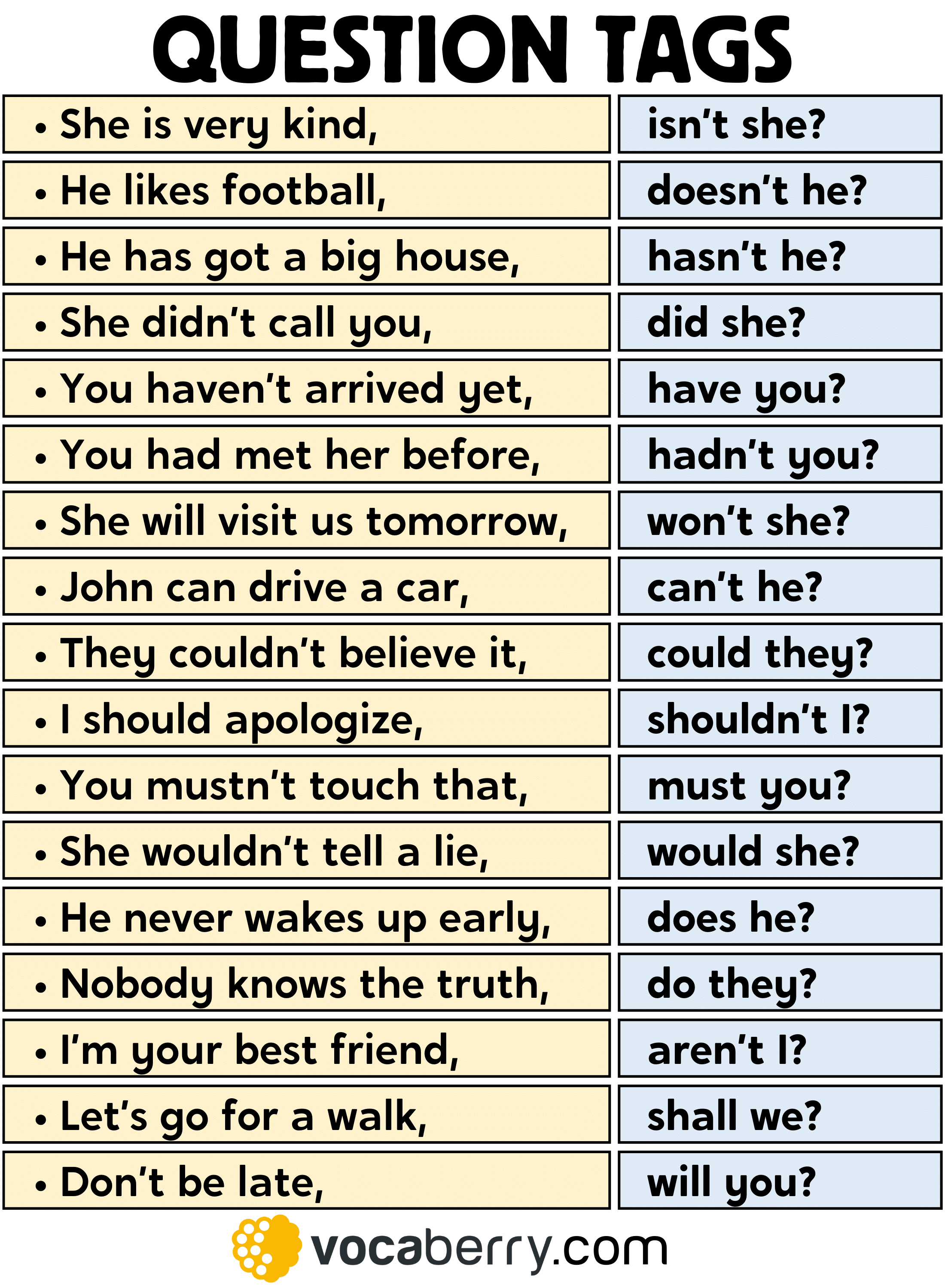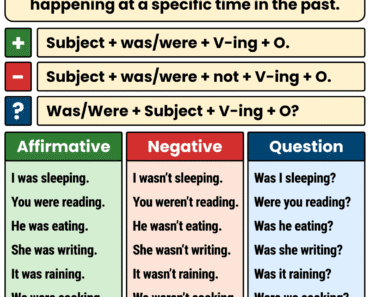
Question tags are short questions that we add to the end of a statement to confirm information, check agreement, or encourage a response. They are commonly used in spoken English and help make conversations more natural and interactive.
In this article, you will learn how to form question tags correctly, the rules to follow, and special cases that may seem tricky. We will also provide plenty of examples to help you understand them easily.
What Are Question Tags?
A question tag is a small question added at the end of a statement. It is used to:
- Confirm information → You’re coming to the party, aren’t you?
- Express surprise → She won the competition, didn’t she?
- Seek agreement → It’s a beautiful day, isn’t it?
Question tags follow a simple rule:
- If the main sentence is positive, the question tag is negative.
- If the main sentence is negative, the question tag is positive.
How to Form Question Tags
A question tag consists of:
- An auxiliary verb (do, does, did, is, are, was, were, have, will, can, etc.)
- A subject pronoun (he, she, it, we, they, you, I)
- A positive or negative form, depending on the main sentence
Let’s go through each rule with simple examples.
1. If the main sentence is positive, the question tag is negative.
When the main sentence is positive, we add a negative question tag using not (n’t).
| Positive Statement | Question Tag |
|---|---|
| You are tired. | Aren’t you? |
| She can swim. | Can’t she? |
| They have finished. | Haven’t they? |
| He is a doctor. | Isn’t he? |
| We will go to the park. | Won’t we? |
| She likes chocolate. | Doesn’t she? |
2. If the main sentence is negative, the question tag is positive.
When the main sentence is negative, we use a positive question tag.
| Negative Statement | Question Tag |
|---|---|
| You don’t like coffee. | Do you? |
| He isn’t coming. | Is he? |
| She hasn’t arrived yet. | Has she? |
| They won’t be late. | Will they? |
| She didn’t see the movie. | Did she? |
| We weren’t invited. | Were we? |
3. Use the same auxiliary verb as in the statement.
The auxiliary (helping) verb used in the statement is repeated in the question tag.
| Statement | Question Tag |
|---|---|
| She was at school. | Wasn’t she? |
| They have been here before. | Haven’t they? |
| You will help me. | Won’t you? |
| He had finished his work. | Hadn’t he? |
| She is watching TV. | Isn’t she? |
4. If there is no auxiliary verb, use “do/does/did.”
When the main verb is in the simple present or simple past, we use do/does/did in the question tag.
| Statement | Question Tag |
|---|---|
| You like ice cream. | Don’t you? |
| He plays football. | Doesn’t he? |
| They went home early. | Didn’t they? |
| She studies English. | Doesn’t she? |
| We watched a movie. | Didn’t we? |
Special Cases in Question Tags
1. “I am” Statements → Use “aren’t I?”
- I am your teacher, aren’t I?
- I am late, aren’t I?
Even though “amn’t I” seems logical, we do not use it in English. Instead, we use “aren’t I?”
2. “Let’s” Sentences → Use “shall we?”
- Let’s go for a walk, shall we?
- Let’s eat out tonight, shall we?
“Shall we?” is the standard question tag after sentences with “Let’s”.
3. Imperative Sentences → Use “will you?”
- Close the door, will you?
- Help me with this, will you?
- Pass the salt, will you?
This makes a command sound polite.
4. “Nothing, Nobody, No one, Neither” → Use Positive Tag
When the subject is a negative word like nothing, nobody, no one, neither, the question tag is positive.
| Negative Subject | Question Tag |
|---|---|
| Nothing is wrong. | Is it? |
| Nobody called. | Did they? |
| No one knows the answer. | Do they? |
| Neither of them came. | Did they? |
Quiz: Question Tags in English
1. You’re coming to the meeting, ___?
a) isn’t it
b) aren’t you
c) don’t you
2. She doesn’t like coffee, ___?
a) is she
b) does she
c) doesn’t she
3. They were at the party, ___?
a) weren’t they
b) wasn’t they
c) didn’t they
4. He hasn’t finished his work, ___?
a) has he
b) does he
c) hasn’t he
5. Let’s go to the beach, ___?
a) do we
b) will we
c) shall we
6. You like chocolate, ___?
a) doesn’t you
b) don’t you
c) isn’t you
7. Nobody was there, ___?
a) was they
b) were they
c) was it
8. I am your best friend, ___?
a) aren’t I
b) amn’t I
c) isn’t I
9. She can swim well, ___?
a) can’t she
b) does she
c) won’t she
10. Close the window, ___?
a) will you
b) won’t you
c) do you
Quiz Answers
1) aren’t you
2) does she
3) weren’t they
4) has he
5) shall we
6) don’t you
7) were they
8) aren’t I
9) can’t she
10) will you







Very very good!
Thank u I need this information